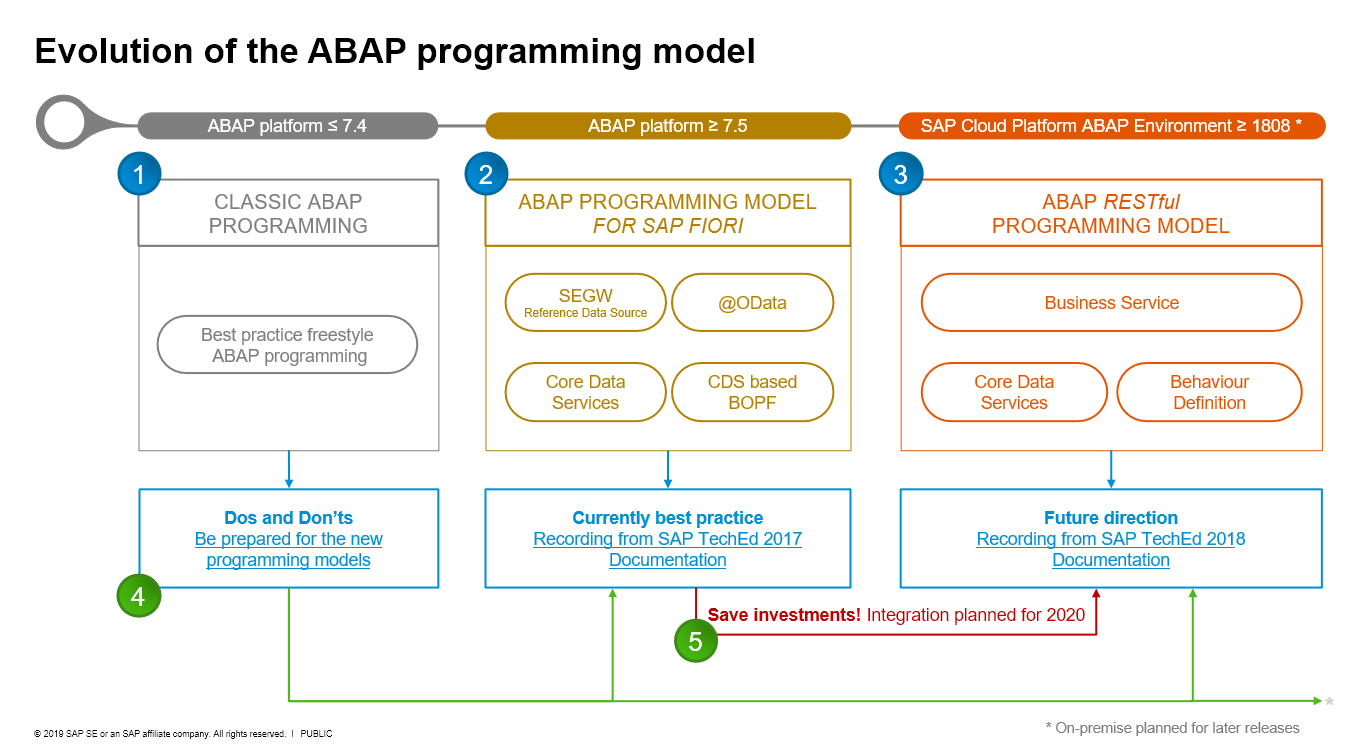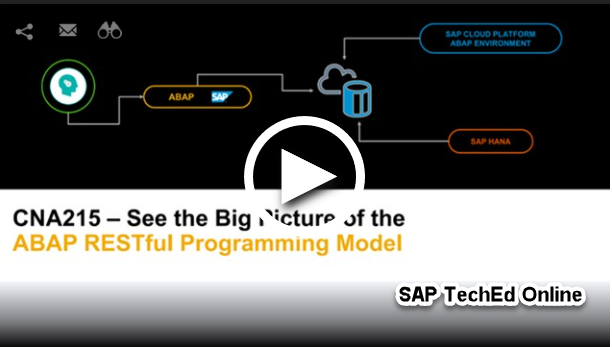
- SAP Community
- Products and Technology
- Technology
- Technology Blogs by SAP
- Evolution of the ABAP Programming Model
- Subscribe to RSS Feed
- Mark as New
- Mark as Read
- Bookmark
- Subscribe
- Printer Friendly Page
- Report Inappropriate Content
| 🔥Check out the new SAP Community page State-of-the-art ABAP Development with RAP! |
| Latest News: 2023-05: ABAP Cloud - SAP S/4HANA Extensibility - May 2023 Update (blog post) 2022-12: About ABAP Cloud (blog post) 2022-09: State-of-the-art ABAP Development with RAP 2021-10: Modernization with RAP (blog post) 2021-07: Compact Feature Availability Matrix of ABAP Programming Models (blog post) 2021-01: Renaming of SAP Cloud Platform ABAP Environment to SAP BTP ABAP Environment 2020-10: Free openSAP course on Building Apps with RAP 2019-10: RAP is available on-premise starting with SAP S/4HANA 1909. Check out Getting Started with RAP |
At the end of my blog post Be prepared for the ABAP Programming Model for SAP Fiori, I mentioned that the ABAP platform development team was working on an evolutionary development of the ABAP Programming Model for SAP Fiori: The ABAP RESTful Application Programming Model.
We’re all set! The ABAP RESTful Application Programming Model (aka ABAP RESTful Programming Model or RAP for short) is now generally available within the SAP Cloud Platform ABAP Environment (renamed to SAP BTP ABAP Environment) – SAP’s new ABAP PaaS offering – launched on September 4th 2018. [Read more]
I would like to explain what this evolution is all about and what it means for ABAP developers, using the illustration below.
 |


 | Classic ABAP Application Programming |
| Most SAP customers are using SAP enterprise software based on the ABAP release 7.50 or lower. On these ABAP releases, various UI technologies are available for building applications, e.g. classic Dynpro, Web Dynpro ABAP, Floorplan Manager and WebClient UI framework. With the ABAP release 7.4, SAP started to heavily optimize the ABAP platform for its in-memory database SAP HANA. In this context ABAP Core Data Services (CDS) were introduced to offer the next generation data modeling infrastructure and data access. CDS-based data models are semantically rich data models that can be used for all application domains. Additionally, SAP Gateway became an integral part of the AS ABAP with release 7.4 and the Business Object Processing Framework (BOPF) also found its way into the ABAP platform with release 7.5. For several reasons – e.g. modern web application user experience, mobile enablement and cloud readiness – SAP decided to support a RESTful communication between backend and frontend. Combined with the decision to apply a new role-based and consumer-grade user experience using a modern UI design paradigm, the new SAP Fiori development stack was born with:
SAP’s decision to make SAPUI5 and OData as core technologies of the SAP Fiori development stack brought new challenges regarding the development of applications – especially transactional apps. | |
| Read more: SAP Fiori | ABAP Development for SAP HANA |
 | ABAP Programming Model for SAP Fiori |
With release 7.5, the ABAP Programming Model for SAP Fiori was first made generally available and then further enhanced with the following releases. The ABAP Programming Model for SAP Fiori offers a standardized way to efficiently develop modern and intrinsically SAP HANA-optimized web-based applications of all types, i.e., search, analytical and transactional apps. It is the current best practice for application developments in SAP S/4HANA. The ABAP Programming Model for SAP Fiori is mainly based on modern and proven technologies such as CDS, BOPF and SAP Gateway, especially using the advanced SEGW option Referenced Data Source (RDS) to easily exposed a given scope of an CDS data model as OData service. A lightweight CDS-based flavor of the BOPF framework is used in this context for the transactional processing. With ABAP 7.51 the draft capability which is used for setting exclusive locks and storing intermediate – and even inconsistent – data was introduced. It enables the development of complex SAP Fiori apps with stateless communication and new application qualities such as continuous work and device switch. The underlying application infrastructure integrates and orchestrates the different technologies in the best possible manner for supporting Greenfield scenarios where new applications, including their custom logic, are designed and implemented from scratch. Greenfield scenarios allow a high level of flexibility regarding the application design and architecture. The situation looks quite different for Brownfield scenarios where the custom transactional application logic typically already exists based on coarse-grained create, update and delete operations and thus allow less flexibility with respect to application design and architecture. Brownfield scenarios are not supported by the ABAP Programming Model for SAP Fiori. After the consolidation of the ABAP Programming Model for SAP Fiori, the next logical step was to integrate the different concepts into the ABAP and CDS languages, as well as to support the complete backend development flow natively in the ABAP Development Tools to reduce the total cost of development (TCD). Another important aspect was to tackle the different limitations due to the use of existing technologies in a non-disruptive manner. With the aim to tackle the different aspects of the SAP Fiori development stack mentioned above, the ABAP RESTful Application Programming Model was introduced! | |
| Learn more: Getting Started with the ABAP Programming Model for SAP Fiori |
 | ABAP RESTful Application Programming Model (RAP) | |||
The ABAP RESTful Application Programming Model (aka ABAP RESTful Programming Model) is the evolutionary successor of the ABAP Programming Model for SAP Fiori. It enables the efficient and standardized development of web-based applications and Web APIs. It is generally available to customers and partners within SAP Cloud Platform ABAP Environment starting with release 1808. SAP has opted here for a cloud-first delivery approach in the SAP Cloud Platform with a quarterly update cycle and plans to deliver it on-premise with SAP S/4HANA at a later time*. The illustration below shows the big picture of the ABAP RESTful Application Programming Model with three main layers:
The golden rules of the ABAP RESTful Application Programming Model are:
Similarly to the ABAP Programming Model for SAP Fiori, business objects remain the major entities in the ABAP RESTful Application Programming Model (RAP). Beside the Greenfield scenarios, Brownfield scenarios are also supported – allowing the reuse of existing legacy code. The OData exposure is now done via business services created in two steps. As first step, a protocol-agnostic service definition where the relevant business objects and additional information (e.g. value helps) to be exposed are specified. And then as second step the binding of the service definition to a given protocol and scenario - UI or Web API. Currently only OData is supported as communication protocol.
| ||||
| Learn more: Getting Started with the ABAP RESTful Application Programming Model |
 | How can SAP customers and partners be prepared for the new world? |
In order to enable a smooth move to the ABAP Programming Model for SAP Fiori at a later time, we’ve compiled a list of recommendations (Dos and Don'ts) for customers and partners developing new applications on ABAP release 7.4 and downwards. These recommendations are also valid for a smooth move to the ABAP RESTful Application Programming Model (RAP). | |
| Read more: Be prepared for the ABAP Programming Model for SAP Fiori (Blog post) |
 | What about applications built with the ABAP Programming Model for SAP Fiori? |
This is a valid question from SAP customers and partners who want to safeguard their investments. SAP is aware of this and plans to provide an integration option of the CDS-based BOPF BOs within RAP to reduce significantly the migration effort from the ABAP Programming Model for SAP Fiori. The current state of planning is to offer such option in the year 2020*. On the other hand, SAP will continue to support the ABAP Programming Model for SAP Fiori beside the ABAP RESTful Application Programming Model in the future for upwards compatibility reasons. Read more: Migration of CDS-based BOPF BOs to RAP BOs (SAP Help) |
Related Information |
| Getting Started with the ABAP RESTful Application Programming Model | SAP Community |
| ABAP RESTful Programming Model - Online Documentation (Cloud) | SAP Help Portal |
| SAP Cloud Platform ABAP Environment | SAP Community |
| About SAP Fiori User Experience | sap.com |
| About ABAP for SAP HANA | SAP Community |
| Getting started with ABAP Core Data Services (CDS) | SAP Community |
| Getting started with the ABAP Programming Model for SAP Fiori | SAP Community |
| Be prepared for the ABAP Programming Model for SAP Fiori (Recommendations, Blog Post) | SAP Community |
| OData service development options - Be Prepared for the ABAP RESTful Application Programming Model (Video) | SAP Community Call |
* This is the current state of planning which may change at any time without further notice from SAP.
You must be a registered user to add a comment. If you've already registered, sign in. Otherwise, register and sign in.
-
ABAP CDS Views - CDC (Change Data Capture)
2 -
AI
1 -
Analyze Workload Data
1 -
BTP
1 -
Business and IT Integration
2 -
Business application stu
1 -
Business Technology Platform
1 -
Business Trends
1,658 -
Business Trends
91 -
CAP
1 -
cf
1 -
Cloud Foundry
1 -
Confluent
1 -
Customer COE Basics and Fundamentals
1 -
Customer COE Latest and Greatest
3 -
Customer Data Browser app
1 -
Data Analysis Tool
1 -
data migration
1 -
data transfer
1 -
Datasphere
2 -
Event Information
1,400 -
Event Information
66 -
Expert
1 -
Expert Insights
177 -
Expert Insights
293 -
General
1 -
Google cloud
1 -
Google Next'24
1 -
Kafka
1 -
Life at SAP
780 -
Life at SAP
12 -
Migrate your Data App
1 -
MTA
1 -
Network Performance Analysis
1 -
NodeJS
1 -
PDF
1 -
POC
1 -
Product Updates
4,577 -
Product Updates
340 -
Replication Flow
1 -
RisewithSAP
1 -
SAP BTP
1 -
SAP BTP Cloud Foundry
1 -
SAP Cloud ALM
1 -
SAP Cloud Application Programming Model
1 -
SAP Datasphere
2 -
SAP S4HANA Cloud
1 -
SAP S4HANA Migration Cockpit
1 -
Technology Updates
6,873 -
Technology Updates
417 -
Workload Fluctuations
1
- Improvising Time Management in SAP S/4HANA Cloud: A Co-Innovation Solution in Technology Blogs by SAP
- Embracing TypeScript in SAPUI5 Development in Technology Blogs by Members
- ABAP Cloud Developer Trial 2022 Available Now in Technology Blogs by SAP
- New Machine Learning features in SAP HANA Cloud in Technology Blogs by SAP
- SAP HANA Cloud Vector Engine: Quick FAQ Reference in Technology Blogs by SAP
| User | Count |
|---|---|
| 32 | |
| 24 | |
| 8 | |
| 7 | |
| 7 | |
| 6 | |
| 6 | |
| 6 | |
| 5 | |
| 4 |

